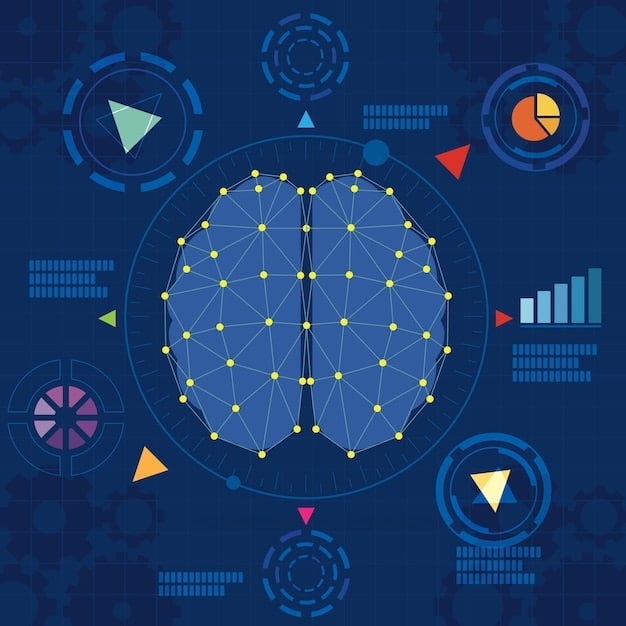Insider Secrets: AI Transforms Online Communities UX by 2025

By 2025, leading online communities are rapidly adopting artificial intelligence to revolutionize user experience, employing AI for enhanced personalization, content moderation, and forging deeper, more meaningful member connections.
The landscape of online communities is ever-evolving, and as we look towards 2025, one technology stands poised to redefine it: artificial intelligence. The ability of AI to process vast amounts of data, understand nuanced interactions, and predict user needs is transforming how these digital spaces function. This article reveals the Insider Secrets: How Top Online Communities Are Using AI to Improve User Experience in 2025, offering a glimpse into the innovative strategies shaping the future of online engagement.
Understanding the Shift: AI as a Community Catalyst
The integration of AI into online communities isn’t merely an upgrade; it’s a fundamental shift in how these platforms operate and how users interact within them. Traditional community management, while essential, often struggles with scale and personalization. AI offers a powerful solution, acting as a catalyst to unlock new levels of engagement and efficiency.
This evolving relationship between AI and community is driven by the need for more dynamic, responsive, and secure environments. As communities grow, the challenges of content overload, moderated content distribution, and user retention become more pronounced. AI provides the tools to address these complexities head-on, creating experiences that feel both intimate and expansive.
Personalized Content Feeds
One of the most immediate and impactful applications of AI is in tailoring the user’s content consumption. Gone are the days of generic chronological feeds. AI algorithms analyze user behavior, preferences, and interaction history to curate a stream of content that is highly relevant to each individual. This means members are more likely to see discussions, articles, and media that genuinely interest them, enhancing their overall experience and increasing time spent on the platform.
- AI analyzes previous interactions and preferences.
- Curates content streams for individual users.
- Increases engagement by showing relevant discussions.
- Reduces content fatigue and improves discoverability.
This personalization extends beyond simple content recommendations. It touches upon event suggestions, relevant group recommendations, and even personalized notifications, ensuring that users are always kept in the loop about what matters most to them within the community. It’s about making a large community feel small and tailored to the individual.
Enhancing Moderation and Safety with AI
Maintaining a safe and civil environment is paramount for any online community, but as communities scale, manual moderation becomes an almost impossible task. This is where AI truly shines, offering robust solutions for content moderation and ensuring user safety.
AI-powered moderation systems can identify and flag inappropriate content, hate speech, spam, and harmful behavior at speeds and volumes impossible for human moderators alone. This proactive approach significantly reduces the exposure of users to negative experiences, fostering a more welcoming and trustworthy atmosphere.
Proactive Content Flagging
AI algorithms are trained on vast datasets of content, learning to recognize patterns associated with violations of community guidelines. This allows them to proactively flag potentially problematic posts, comments, and direct messages before they can cause significant harm. While not a replacement for human oversight, it provides a critical first line of defense.
- Real-time detection of policy violations.
- Identification of harmful language and imagery.
- Analysis of user behavior for suspicious patterns.
- Reduced workload for human moderation teams.
The beauty of these systems lies in their continuous learning. As new forms of harmful content emerge, AI models can be retrained and updated, ensuring they remain effective against evolving threats. This adaptability is key to maintaining a secure online space in the long term.

AI-Powered Personalization and Engagement
Beyond content feeds, AI is becoming instrumental in deepening user engagement by creating highly personalized experiences that encourage interaction and participation. This goes beyond simple recommendations, venturing into predictive analytics and proactive support.
By understanding user activity, participation levels, and even emotional sentiment expressed through text, AI can anticipate needs and offer tailored prompts or resources. This creates a more responsive and seemingly intelligent community environment.
Intelligent Matchmaking and Networking
Many online communities thrive on connections. AI is being used to facilitate these connections by intelligently matching users with similar interests, expertise, or goals. This can be for mentorship programs, project collaborations, or simply finding like-minded individuals for casual discussion.
The algorithms consider various factors, including expressed interests, past interactions, demographic data (where applicable and privacy-compliant), and even linguistic patterns to suggest meaningful connections. This moves beyond simple keyword matching to a more nuanced understanding of compatibility.
- Connects users based on shared interests and expertise.
- Facilitates mentorship and collaboration opportunities.
- Analyzes multiple data points for precise matches.
- Enhances the sense of belonging and community.
This type of intelligent matchmaking transforms passive community members into active participants, fostering a stronger sense of belonging and making the community a more valuable resource for everyone involved. It’s about building meaningful bridges, not just casting wide nets.
Automating Support and Frequently Asked Questions (FAQs)
Community managers often spend significant time addressing repetitive questions and providing basic support. AI-powered chatbots and virtual assistants are revolutionizing this aspect, freeing up human resources for more complex issues and enhancing user satisfaction through instant responses.
These AI tools are trained on extensive knowledge bases, allowing them to accurately answer common queries, guide users through platform features, and even troubleshoot minor issues. This immediate access to information significantly improves the user experience, reducing frustration and wait times.
Smart Chatbots and Virtual Assistants
The modern online community increasingly features sophisticated chatbots capable of understanding natural language. These bots can handle a wide range of inquiries, from “How do I change my profile picture?” to “Where can I find discussions on AI ethics?” They operate 24/7, providing consistent support.
- Provides instant answers to common questions.
- Guides users through platform functionalities.
- Available 24/7 for continuous support.
- Reduces the burden on human support staff.
Furthermore, these AI assistants can learn from interactions, continuously improving their accuracy and expanding their knowledge base. When a query is too complex for the AI, it can seamlessly escalate the issue to a human moderator or support agent, ensuring no user is left without assistance.
Data Analytics and Community Growth Strategies
One of the less visible but equally impactful applications of AI in online communities is in data analysis. AI can sift through vast quantities of user data – always ethically and with privacy in mind – to identify trends, predict behaviors, and inform strategic decisions for community growth and improvement.
By understanding what content resonates, when users are most active, which features are underutilized, or where potential pain points exist, community administrators can make data-driven decisions that lead to stronger engagement and healthier growth. This moves community management from reactive to proactive.
Predictive Analytics for Retention
AI models can analyze user activity patterns to predict which members might be at risk of disengaging. This allows community managers to proactively reach out with targeted messages, special content, or personalized support to re-engage those members before they leave.
Understanding these subtle cues, such as declining participation, reduced login frequency, or changes in content consumption, enables timely interventions that can significantly impact long-term member retention. It’s about fostering loyalty through informed care.
- Identifies users at risk of disengagement.
- Enables proactive outreach and re-engagement strategies.
- Analyzes activity patterns for early warning signs.
- Improves overall member retention rates.

Challenges and Ethical Considerations of AI in Communities
While the benefits of AI in online communities are undeniable, it’s crucial to acknowledge the challenges and ethical considerations that come with its deployment. The responsible implementation of AI is key to harnessing its power without compromising user trust or privacy.
Concerns around data privacy, algorithmic bias, and the transparency of AI decision-making are critical. Community operators must navigate these complex issues carefully, ensuring that AI tools enhance, rather than detract from, the human element of online interaction.
Addressing Algorithmic Bias
AI systems learn from the data they are fed, and if that data contains biases, the AI will perpetuate and even amplify them. This can lead to unfair treatment, discrimination, or skewed content moderation outcomes within a community. Actively working to identify and mitigate bias in AI algorithms is an ongoing ethical imperative.
Regular audits, diverse training datasets, and a commitment to transparency regarding how AI models make decisions are essential steps. It is a continuous process of refinement to ensure equity and fairness for all community members.
- Ensure diverse and representative training data for AI.
- Regularly audit algorithms for unintended biases.
- Maintain transparency in AI decision-making processes.
- Prioritize fairness and equity in AI application.
Furthermore, the balance between automation and human oversight needs constant evaluation. AI should augment human capabilities, not entirely replace them, especially in sensitive areas like emotional support or complex moderation decisions. A hybrid approach often yields the best outcomes.
| Key Benefit | Brief Description |
|---|---|
| 🎯 Personalized Feeds | AI curates content tailored to individual user interests, increasing engagement. |
| 🛡️ Enhanced Moderation | AI proactively identifies and flags inappropriate content, ensuring safety. |
| 🤝 Smart Matchmaking | Connects users with similar interests, fostering stronger community bonds. |
| 📈 Data-Driven Growth | Utilizes AI analytics to inform strategies for community development and retention. |
Frequently Asked Questions About AI in Online Communities
▼
AI personalizes user experience by analyzing individual browsing history, interaction patterns, and expressed preferences. This data allows algorithms to recommend tailored content, suggest relevant groups, and highlight discussions most likely to engage each user, making the community feel more relevant and customized to their needs.
▼
No, AI cannot fully replace human moderators. While AI excels at identifying and flagging problematic content at scale, human moderators bring nuanced understanding, empathy, and judgment for complex situations that AI currently lacks. AI acts as a powerful tool to augment human moderation efforts, creating a more efficient and effective moderation system.
▼
The primary benefits include real-time detection of harmful content, scalability to manage large communities, reduced burden on human moderation teams by automating repetitive tasks, and improved consistency in enforcing community guidelines. AI helps create a safer, more welcoming environment by quickly addressing inappropriate behavior.
▼
AI assists with user retention by predicting members at risk of disengagement based on their activity patterns. This allows community managers to proactively intervene with personalized content, outreach, or support. Additionally, personalized content feeds and improved safety contribute to a more satisfying experience, encouraging users to stay active longer.
▼
Key ethical concerns include data privacy and security, potential algorithmic bias leading to unfair treatment, lack of transparency in AI’s decision-making processes, and the risk of over-automation diminishing the human element of community interaction. Responsible AI deployment requires constant monitoring and a commitment to address these issues.
Conclusion
As we approach 2025, it’s clear that AI is not just a passing trend but a foundational technology reshaping online communities. From hyper-personalized experiences and robust moderation to intelligent matchmaking and data-driven growth strategies, AI is empowering platforms to deliver unparalleled user satisfaction. While challenges concerning ethics and bias remain, the ongoing evolution of AI promises a future where online communities are more engaging, safer, and remarkably more responsive to the needs of their members. The secrets of success lie in harnessing this transformative power responsibly, ensuring that technology serves to amplify human connection rather than diminish it.





